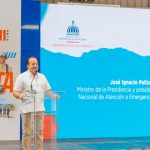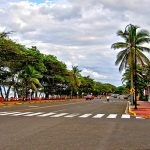Isfodosu holds graduation ceremony for 16 new specialists in Dominican classics
Santo Domingo.- On Saturday, March 2nd, the Instituto de Formación Docente Salomé Ureña (Isfodosu) held a graduation ceremony for sixteen graduates of the “Colección de Clásicos Dominicanos Narrativa 1” diploma program. These young people could study thanks to scholarships granted by the educational institution.
The ceremony was attended by prominent figures from the educational and cultural spheres, including the Executive Director of the Liceo Félix Evaristo Mejía, Glenny Bórquez; the head of the Postgraduate and Continuing Education Unit, Bethania Valdez; the coordinator of the diploma program, Daily Pérez; and the teacher who taught the program, María Carla Picón.
María Carla Picón, a graduate in Literature from the Universidad Central de Venezuela, with a master’s degree in Hispanic Lexicography from the Real Academia Española and the Universidad de León, Spain, and a diploma in Academic and Institutional Editing from the Instituto Caro y Cuervo de Colombia, is a renowned editor, writer, poet, university professor, and researcher. Her extensive experience and knowledge were fundamental in guiding the students through this enriching program.
During the diploma program, participants had the opportunity to immerse themselves in the study of ten masterpieces of Dominican literature: Enriquillo by Manuel de Jesús Galván, Cartas a Evelina by Francisco Gregorio Billini, La Fantasma de Higüey by Francisco Javier Angulo Guridi, La sangre by Tulio M. Cestero, Guanuma by Federico García Godoy, Cuentos cimarrones by Sócrates Nolasco, Crónicas de Altocerro by Virgilio Díaz Grullón, Trementina, clerén y bongó by Julio González Herrera, Over by Ramón Marrero Aristy and El Montero by Pedro Enrique Bonó.
These works, pillars of the Dominican narrative, offer a window into the country’s history, culture, and identity.
As a final project for the diploma program, students were challenged to write an essay exploring the common thread that linked all these works. This exercise allowed them to not only deepen their understanding of each text, but also to discover the thematic, stylistic, and contextual connections that weave together the Dominican literary tradition.
During the graduation ceremony, a symposium was held in which the graduates could present their theses and viewpoints on the works studied. This space for intellectual exchange allowed the participants to share their interpretations, insights, and reflections on the Dominican classics.
The depth and diversity of the analyses carried out by the graduates were evident, as they demonstrated a solid command of the texts and their contexts. The symposium was a testament to the commitment and passion of these teachers and bodes well for the future of research and dissemination of our literary heritage.
The graduation of these sixteen new specialists in Dominican classics represents a significant achievement for both them and the Isfodosu institution and the country as a whole. Their dedication and passion for Dominican literature are a testament to the value and relevance that these texts continue to have today.
















